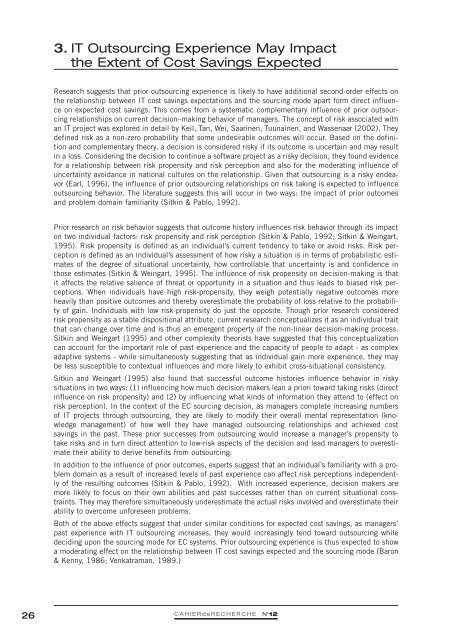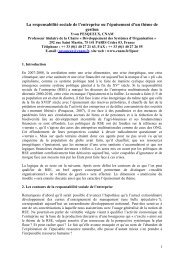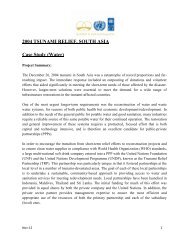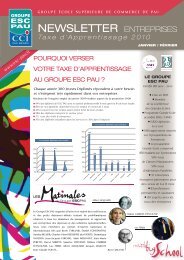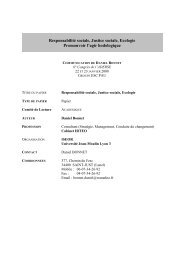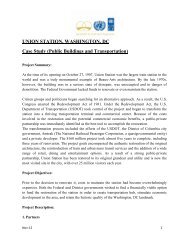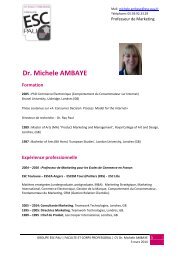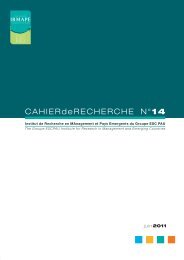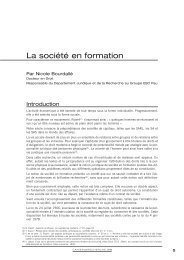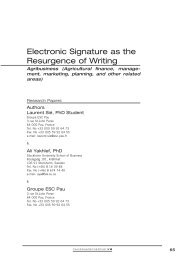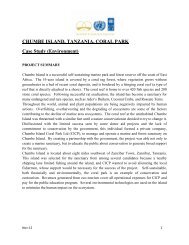Cahier de recherche N°12 - ESC Pau
Cahier de recherche N°12 - ESC Pau
Cahier de recherche N°12 - ESC Pau
Create successful ePaper yourself
Turn your PDF publications into a flip-book with our unique Google optimized e-Paper software.
3. IT Outsourcing Experience May Impactthe Extent of Cost Savings ExpectedResearch suggests that prior outsourcing experience is likely to have additional second-or<strong>de</strong>r effects onthe relationship between IT cost savings expectations and the sourcing mo<strong>de</strong> apart form direct influenceon expected cost savings. This comes from a systematic complementary influence of prior outsourcingrelationships on current <strong>de</strong>cision–making behavior of managers. The concept of risk associated withan IT project was explored in <strong>de</strong>tail by Keil, Tan, Wei, Saarinen, Tuunainen, and Wassenaar (2002). They<strong>de</strong>fined risk as a non-zero probability that some un<strong>de</strong>sirable outcomes will occur. Based on the <strong>de</strong>finitionand complementary theory, a <strong>de</strong>cision is consi<strong>de</strong>red risky if its outcome is uncertain and may resultin a loss. Consi<strong>de</strong>ring the <strong>de</strong>cision to continue a software project as a risky <strong>de</strong>cision, they found evi<strong>de</strong>ncefor a relationship between risk propensity and risk perception and also for the mo<strong>de</strong>rating influence ofuncertainty avoidance in national cultures on the relationship. Given that outsourcing is a risky en<strong>de</strong>avor(Earl, 1996), the influence of prior outsourcing relationships on risk taking is expected to influenceoutsourcing behavior. The literature suggests this will occur in two ways: the impact of prior outcomesand problem domain familiarity (Sitkin & Pablo, 1992).Prior research on risk behavior suggests that outcome history influences risk behavior through its impacton two individual factors: risk propensity and risk perception (Sitkin & Pablo, 1992; Sitkin & Weingart,1995). Risk propensity is <strong>de</strong>fined as an individual’s current ten<strong>de</strong>ncy to take or avoid risks. Risk perceptionis <strong>de</strong>fined as an individual’s assessment of how risky a situation is in terms of probabilistic estimatesof the <strong>de</strong>gree of situational uncertainty, how controllable that uncertainty is and confi<strong>de</strong>nce inthose estimates (Sitkin & Weingart, 1995). The influence of risk propensity on <strong>de</strong>cision-making is thatit affects the relative salience of threat or opportunity in a situation and thus leads to biased risk perceptions.When individuals have high risk-propensity, they weigh potentially negative outcomes moreheavily than positive outcomes and thereby overestimate the probability of loss relative to the probabilityof gain. Individuals with low risk-propensity do just the opposite. Though prior research consi<strong>de</strong>redrisk propensity as a stable dispositional attribute, current research conceptualizes it as an individual traitthat can change over time and is thus an emergent property of the non-linear <strong>de</strong>cision-making process.Sitkin and Weingart (1995) and other complexity theorists have suggested that this conceptualizationcan account for the important role of past experience and the capacity of people to adapt - as complexadaptive systems - while simultaneously suggesting that as individual gain more experience, they maybe less susceptible to contextual influences and more likely to exhibit cross-situational consistency.Sitkin and Weingart (1995) also found that successful outcome histories influence behavior in riskysituations in two ways: (1) influencing how much <strong>de</strong>cision makers lean a priori toward taking risks (directinfluence on risk propensity) and (2) by influencing what kinds of information they attend to (effect onrisk perception). In the context of the EC sourcing <strong>de</strong>cision, as managers complete increasing numbersof IT projects through outsourcing, they are likely to modify their overall mental representation (knowledgemanagement) of how well they have managed outsourcing relationships and achieved costsavings in the past. These prior successes from outsourcing would increase a manager’s propensity totake risks and in turn direct attention to low-risk aspects of the <strong>de</strong>cision and lead managers to overestimatetheir ability to <strong>de</strong>rive benefits from outsourcing.In addition to the influence of prior outcomes, experts suggest that an individual’s familiarity with a problemdomain as a result of increased levels of past experience can affect risk perceptions in<strong>de</strong>pen<strong>de</strong>ntlyof the resulting outcomes (Sitkin & Pablo, 1992). With increased experience, <strong>de</strong>cision makers aremore likely to focus on their own abilities and past successes rather than on current situational constraints.They may therefore simultaneously un<strong>de</strong>restimate the actual risks involved and overestimate theirability to overcome unforeseen problems.Both of the above effects suggest that un<strong>de</strong>r similar conditions for expected cost savings, as managers’past experience with IT outsourcing increases, they would increasingly tend toward outsourcing while<strong>de</strong>ciding upon the sourcing mo<strong>de</strong> for EC systems. Prior outsourcing experience is thus expected to showa mo<strong>de</strong>rating effect on the relationship between IT cost savings expected and the sourcing mo<strong>de</strong> (Baron& Kenny, 1986; Venkatraman, 1989.)26CAHIER<strong>de</strong>RECHERCHE N°12


